Taxation Law: CGT, Small Business Concessions and Asset Valuation
VerifiedAdded on 2023/01/04
|7
|1231
|31
Report
AI Summary
This assignment analyzes a taxation law case concerning Melanie, a sole trader who owns a supermarket, focusing on capital gains tax (CGT) and small business concessions. The central issue revolves around determining Melanie's CGT liability from the sale of her business assets, including goodwill, equipment, and land, as well as receipts from a restrictive covenant. The assignment references Australian Taxation Office (ATO) guidelines, specifically regarding the eligibility for CGT concessions under Subdivision 152-B, C, D, and E, detailing requirements such as turnover thresholds and asset usage. The application section assesses Melanie's eligibility for various concessions, considering the sale of goodwill, depreciating assets, and trading stock, alongside her age and asset ownership. The analysis includes calculations of net capital gains or losses and concludes with recommendations for tax optimization, emphasizing the applicability of the small business concession to reduce her capital gains. The references include various taxation law resources and publications.
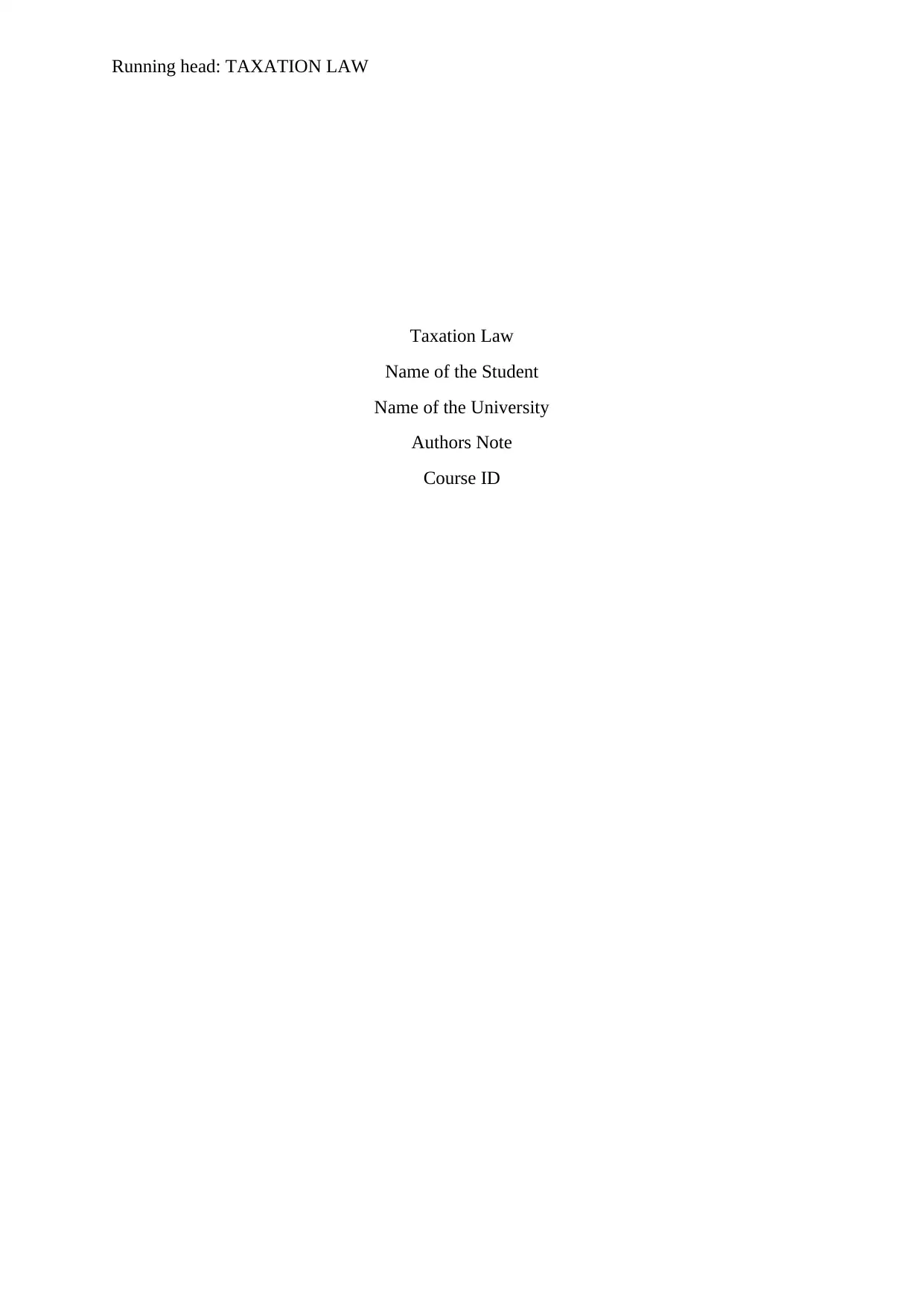
Running head: TAXATION LAW
Taxation Law
Name of the Student
Name of the University
Authors Note
Course ID
Taxation Law
Name of the Student
Name of the University
Authors Note
Course ID
Paraphrase This Document
Need a fresh take? Get an instant paraphrase of this document with our AI Paraphraser
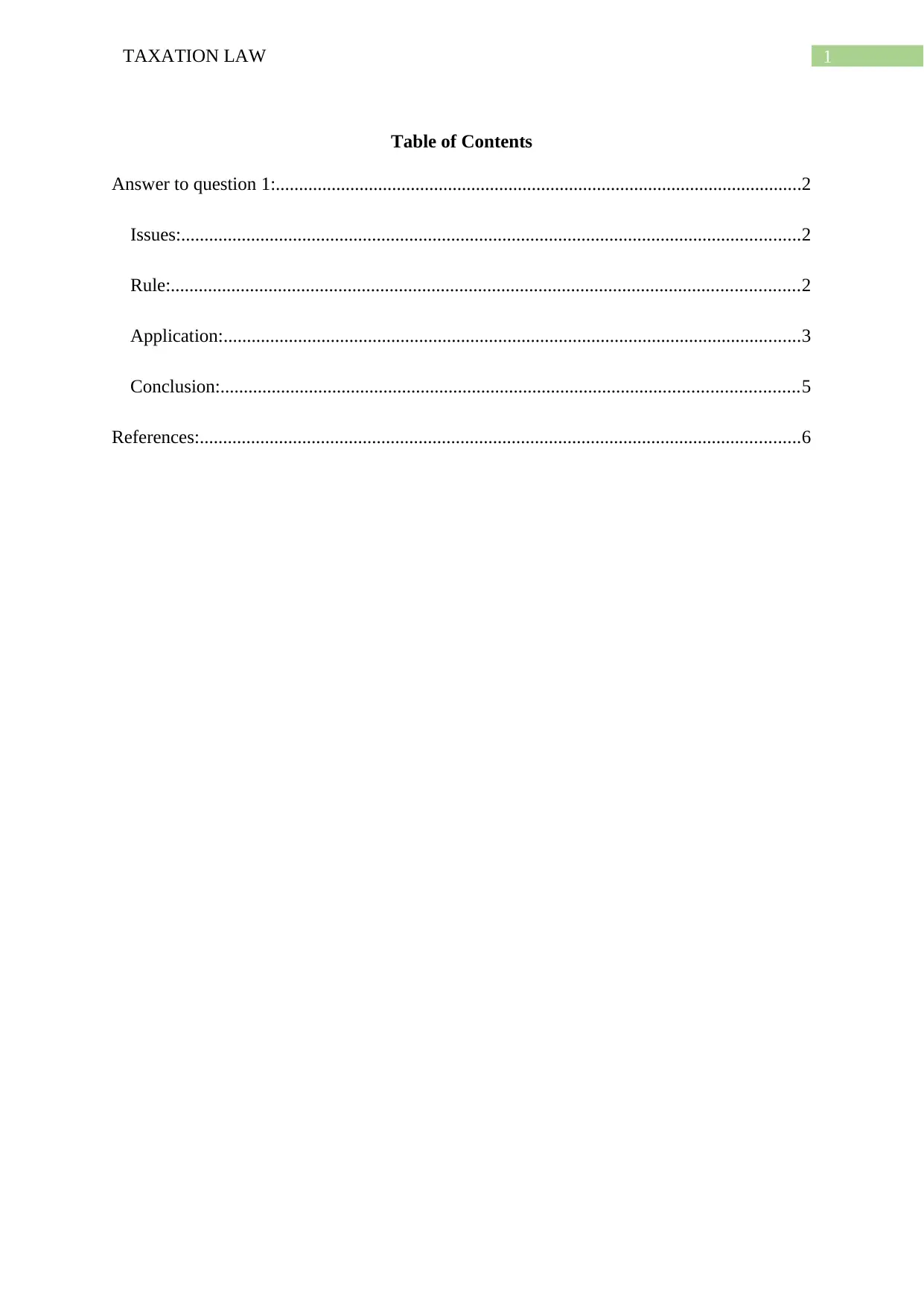
1TAXATION LAW
Table of Contents
Answer to question 1:.................................................................................................................2
Issues:.....................................................................................................................................2
Rule:.......................................................................................................................................2
Application:............................................................................................................................3
Conclusion:............................................................................................................................5
References:.................................................................................................................................6
Table of Contents
Answer to question 1:.................................................................................................................2
Issues:.....................................................................................................................................2
Rule:.......................................................................................................................................2
Application:............................................................................................................................3
Conclusion:............................................................................................................................5
References:.................................................................................................................................6
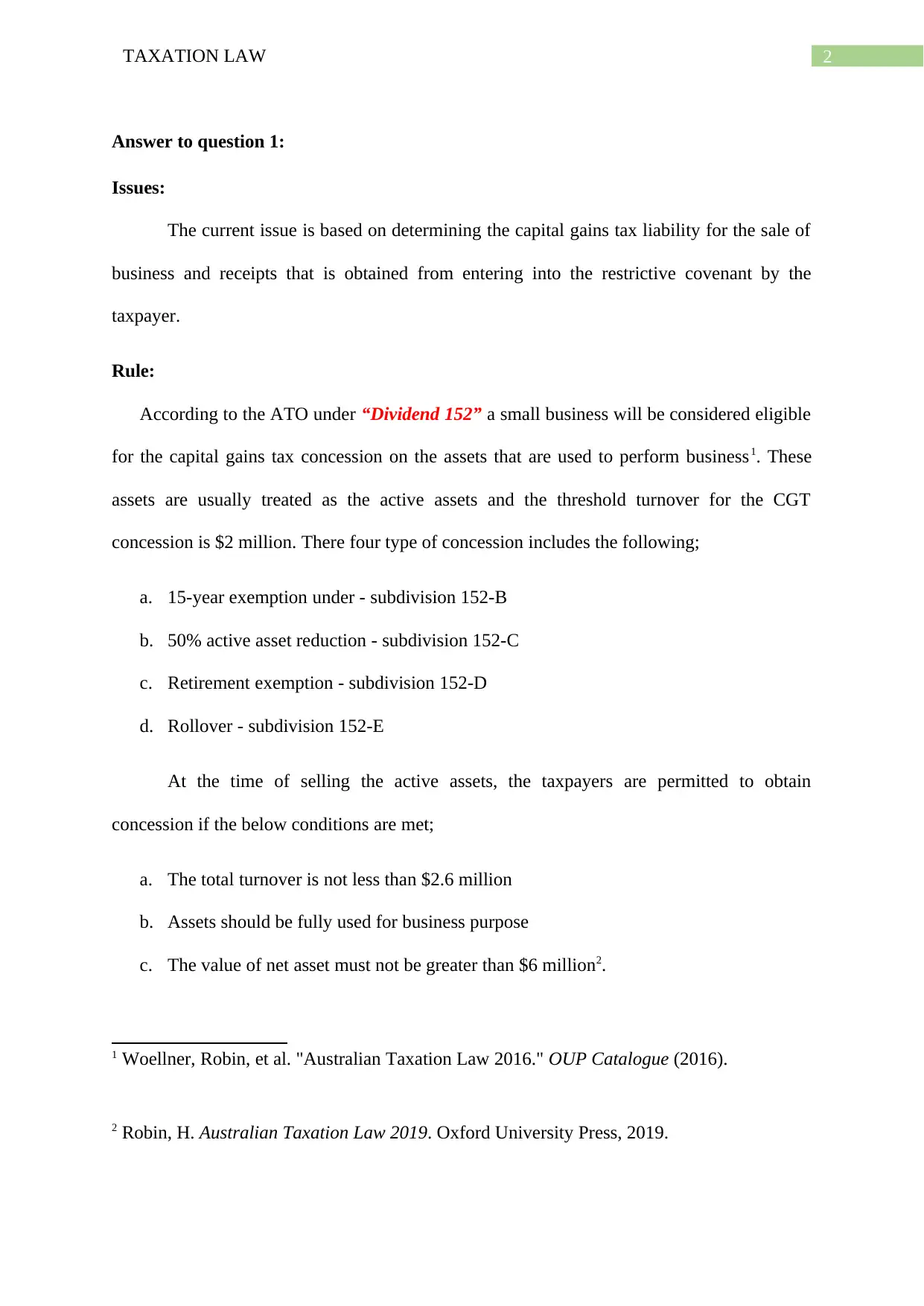
2TAXATION LAW
Answer to question 1:
Issues:
The current issue is based on determining the capital gains tax liability for the sale of
business and receipts that is obtained from entering into the restrictive covenant by the
taxpayer.
Rule:
According to the ATO under “Dividend 152” a small business will be considered eligible
for the capital gains tax concession on the assets that are used to perform business1. These
assets are usually treated as the active assets and the threshold turnover for the CGT
concession is $2 million. There four type of concession includes the following;
a. 15-year exemption under - subdivision 152-B
b. 50% active asset reduction - subdivision 152-C
c. Retirement exemption - subdivision 152-D
d. Rollover - subdivision 152-E
At the time of selling the active assets, the taxpayers are permitted to obtain
concession if the below conditions are met;
a. The total turnover is not less than $2.6 million
b. Assets should be fully used for business purpose
c. The value of net asset must not be greater than $6 million2.
1 Woellner, Robin, et al. "Australian Taxation Law 2016." OUP Catalogue (2016).
2 Robin, H. Australian Taxation Law 2019. Oxford University Press, 2019.
Answer to question 1:
Issues:
The current issue is based on determining the capital gains tax liability for the sale of
business and receipts that is obtained from entering into the restrictive covenant by the
taxpayer.
Rule:
According to the ATO under “Dividend 152” a small business will be considered eligible
for the capital gains tax concession on the assets that are used to perform business1. These
assets are usually treated as the active assets and the threshold turnover for the CGT
concession is $2 million. There four type of concession includes the following;
a. 15-year exemption under - subdivision 152-B
b. 50% active asset reduction - subdivision 152-C
c. Retirement exemption - subdivision 152-D
d. Rollover - subdivision 152-E
At the time of selling the active assets, the taxpayers are permitted to obtain
concession if the below conditions are met;
a. The total turnover is not less than $2.6 million
b. Assets should be fully used for business purpose
c. The value of net asset must not be greater than $6 million2.
1 Woellner, Robin, et al. "Australian Taxation Law 2016." OUP Catalogue (2016).
2 Robin, H. Australian Taxation Law 2019. Oxford University Press, 2019.
⊘ This is a preview!⊘
Do you want full access?
Subscribe today to unlock all pages.

Trusted by 1+ million students worldwide
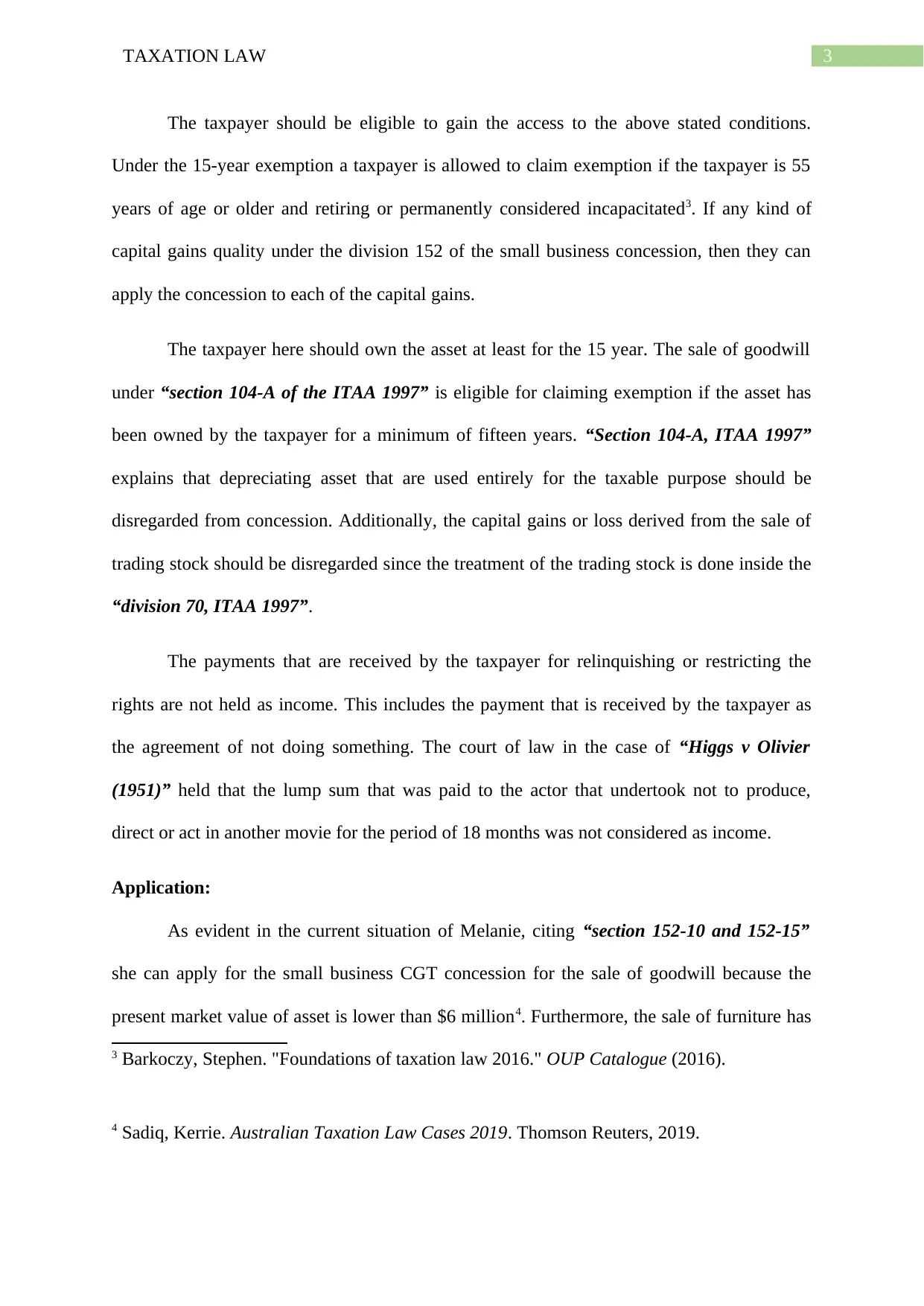
3TAXATION LAW
The taxpayer should be eligible to gain the access to the above stated conditions.
Under the 15-year exemption a taxpayer is allowed to claim exemption if the taxpayer is 55
years of age or older and retiring or permanently considered incapacitated3. If any kind of
capital gains quality under the division 152 of the small business concession, then they can
apply the concession to each of the capital gains.
The taxpayer here should own the asset at least for the 15 year. The sale of goodwill
under “section 104-A of the ITAA 1997” is eligible for claiming exemption if the asset has
been owned by the taxpayer for a minimum of fifteen years. “Section 104-A, ITAA 1997”
explains that depreciating asset that are used entirely for the taxable purpose should be
disregarded from concession. Additionally, the capital gains or loss derived from the sale of
trading stock should be disregarded since the treatment of the trading stock is done inside the
“division 70, ITAA 1997”.
The payments that are received by the taxpayer for relinquishing or restricting the
rights are not held as income. This includes the payment that is received by the taxpayer as
the agreement of not doing something. The court of law in the case of “Higgs v Olivier
(1951)” held that the lump sum that was paid to the actor that undertook not to produce,
direct or act in another movie for the period of 18 months was not considered as income.
Application:
As evident in the current situation of Melanie, citing “section 152-10 and 152-15”
she can apply for the small business CGT concession for the sale of goodwill because the
present market value of asset is lower than $6 million4. Furthermore, the sale of furniture has
3 Barkoczy, Stephen. "Foundations of taxation law 2016." OUP Catalogue (2016).
4 Sadiq, Kerrie. Australian Taxation Law Cases 2019. Thomson Reuters, 2019.
The taxpayer should be eligible to gain the access to the above stated conditions.
Under the 15-year exemption a taxpayer is allowed to claim exemption if the taxpayer is 55
years of age or older and retiring or permanently considered incapacitated3. If any kind of
capital gains quality under the division 152 of the small business concession, then they can
apply the concession to each of the capital gains.
The taxpayer here should own the asset at least for the 15 year. The sale of goodwill
under “section 104-A of the ITAA 1997” is eligible for claiming exemption if the asset has
been owned by the taxpayer for a minimum of fifteen years. “Section 104-A, ITAA 1997”
explains that depreciating asset that are used entirely for the taxable purpose should be
disregarded from concession. Additionally, the capital gains or loss derived from the sale of
trading stock should be disregarded since the treatment of the trading stock is done inside the
“division 70, ITAA 1997”.
The payments that are received by the taxpayer for relinquishing or restricting the
rights are not held as income. This includes the payment that is received by the taxpayer as
the agreement of not doing something. The court of law in the case of “Higgs v Olivier
(1951)” held that the lump sum that was paid to the actor that undertook not to produce,
direct or act in another movie for the period of 18 months was not considered as income.
Application:
As evident in the current situation of Melanie, citing “section 152-10 and 152-15”
she can apply for the small business CGT concession for the sale of goodwill because the
present market value of asset is lower than $6 million4. Furthermore, the sale of furniture has
3 Barkoczy, Stephen. "Foundations of taxation law 2016." OUP Catalogue (2016).
4 Sadiq, Kerrie. Australian Taxation Law Cases 2019. Thomson Reuters, 2019.
Paraphrase This Document
Need a fresh take? Get an instant paraphrase of this document with our AI Paraphraser
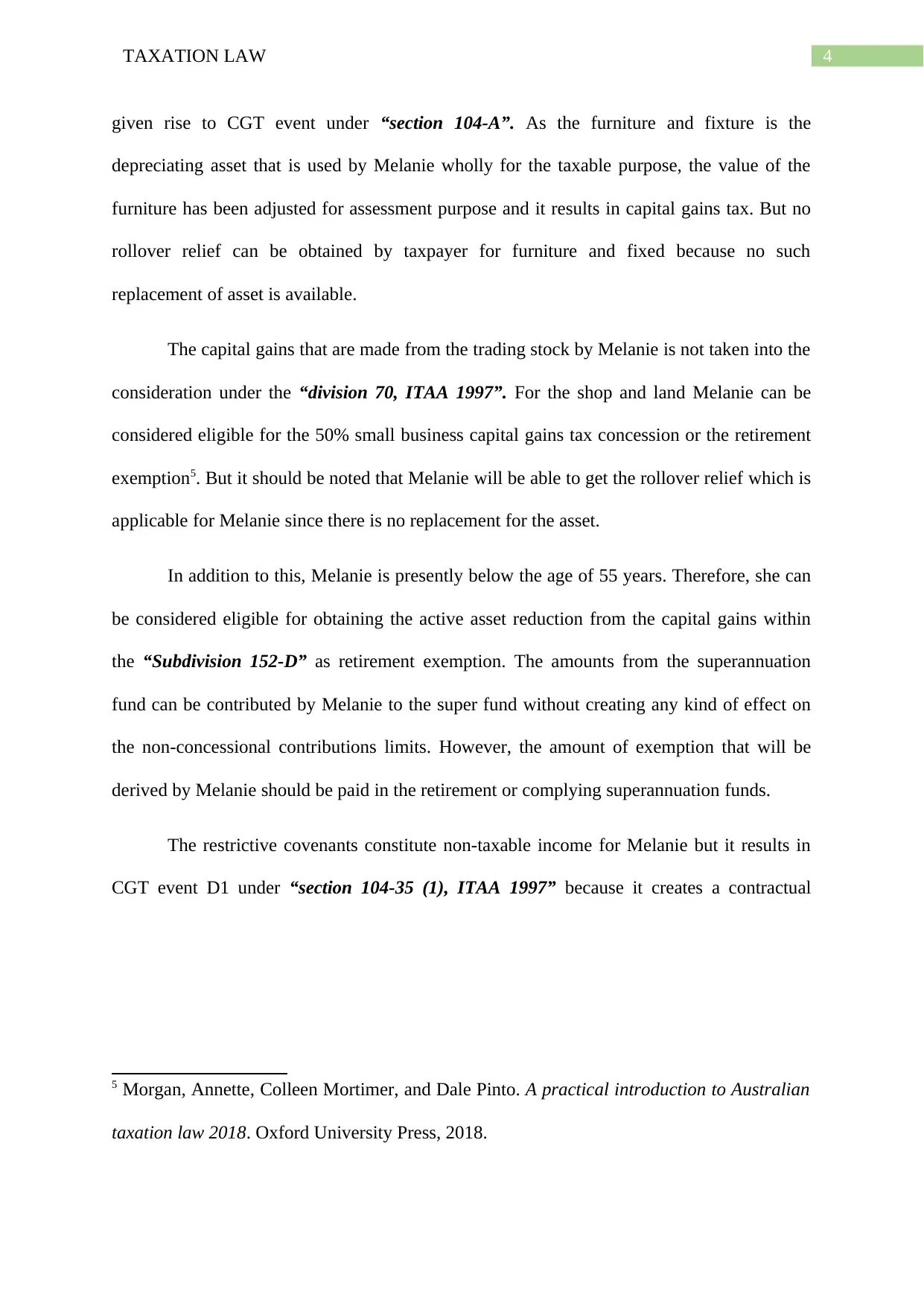
4TAXATION LAW
given rise to CGT event under “section 104-A”. As the furniture and fixture is the
depreciating asset that is used by Melanie wholly for the taxable purpose, the value of the
furniture has been adjusted for assessment purpose and it results in capital gains tax. But no
rollover relief can be obtained by taxpayer for furniture and fixed because no such
replacement of asset is available.
The capital gains that are made from the trading stock by Melanie is not taken into the
consideration under the “division 70, ITAA 1997”. For the shop and land Melanie can be
considered eligible for the 50% small business capital gains tax concession or the retirement
exemption5. But it should be noted that Melanie will be able to get the rollover relief which is
applicable for Melanie since there is no replacement for the asset.
In addition to this, Melanie is presently below the age of 55 years. Therefore, she can
be considered eligible for obtaining the active asset reduction from the capital gains within
the “Subdivision 152-D” as retirement exemption. The amounts from the superannuation
fund can be contributed by Melanie to the super fund without creating any kind of effect on
the non-concessional contributions limits. However, the amount of exemption that will be
derived by Melanie should be paid in the retirement or complying superannuation funds.
The restrictive covenants constitute non-taxable income for Melanie but it results in
CGT event D1 under “section 104-35 (1), ITAA 1997” because it creates a contractual
5 Morgan, Annette, Colleen Mortimer, and Dale Pinto. A practical introduction to Australian
taxation law 2018. Oxford University Press, 2018.
given rise to CGT event under “section 104-A”. As the furniture and fixture is the
depreciating asset that is used by Melanie wholly for the taxable purpose, the value of the
furniture has been adjusted for assessment purpose and it results in capital gains tax. But no
rollover relief can be obtained by taxpayer for furniture and fixed because no such
replacement of asset is available.
The capital gains that are made from the trading stock by Melanie is not taken into the
consideration under the “division 70, ITAA 1997”. For the shop and land Melanie can be
considered eligible for the 50% small business capital gains tax concession or the retirement
exemption5. But it should be noted that Melanie will be able to get the rollover relief which is
applicable for Melanie since there is no replacement for the asset.
In addition to this, Melanie is presently below the age of 55 years. Therefore, she can
be considered eligible for obtaining the active asset reduction from the capital gains within
the “Subdivision 152-D” as retirement exemption. The amounts from the superannuation
fund can be contributed by Melanie to the super fund without creating any kind of effect on
the non-concessional contributions limits. However, the amount of exemption that will be
derived by Melanie should be paid in the retirement or complying superannuation funds.
The restrictive covenants constitute non-taxable income for Melanie but it results in
CGT event D1 under “section 104-35 (1), ITAA 1997” because it creates a contractual
5 Morgan, Annette, Colleen Mortimer, and Dale Pinto. A practical introduction to Australian
taxation law 2018. Oxford University Press, 2018.
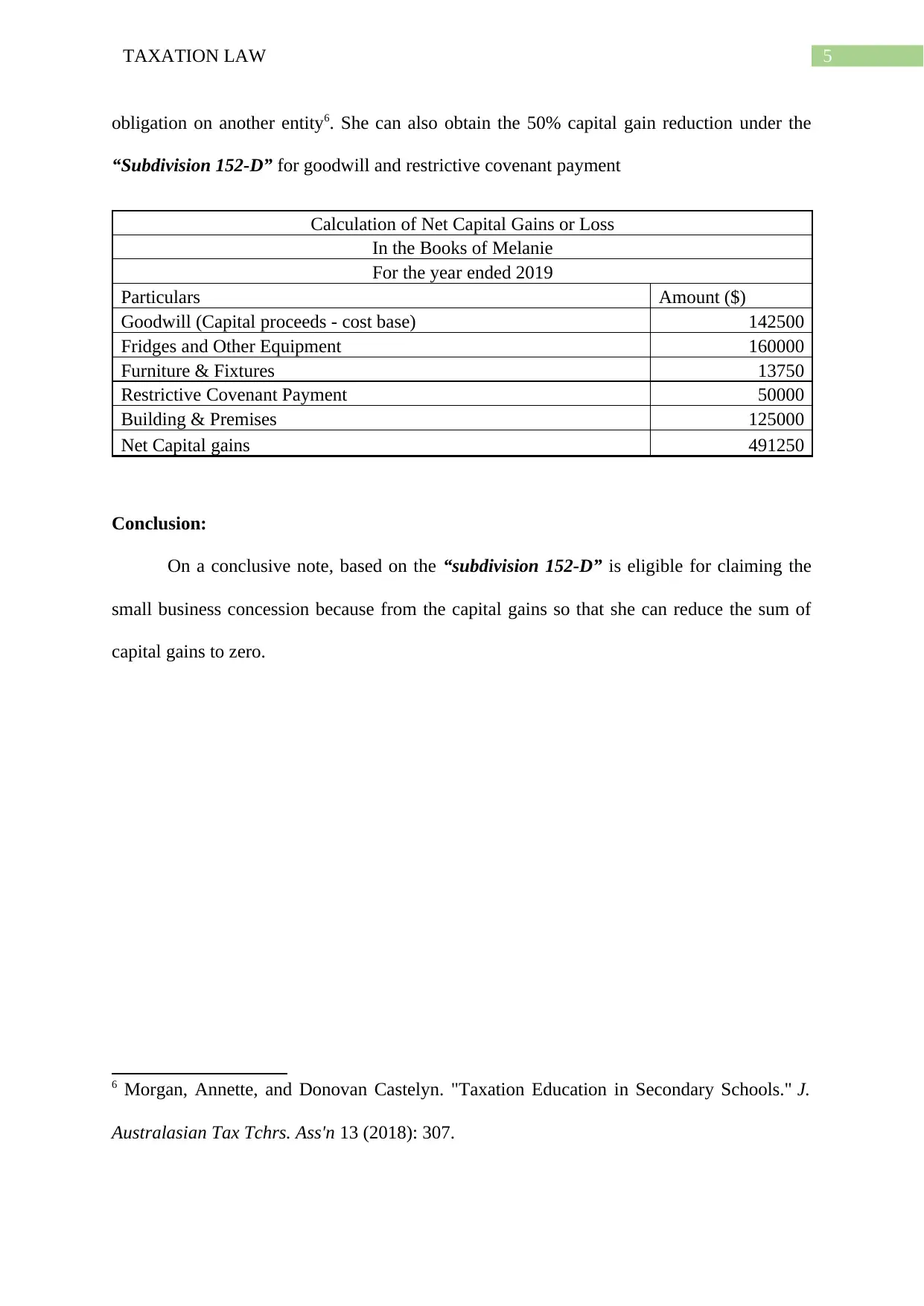
5TAXATION LAW
obligation on another entity6. She can also obtain the 50% capital gain reduction under the
“Subdivision 152-D” for goodwill and restrictive covenant payment
Calculation of Net Capital Gains or Loss
In the Books of Melanie
For the year ended 2019
Particulars Amount ($)
Goodwill (Capital proceeds - cost base) 142500
Fridges and Other Equipment 160000
Furniture & Fixtures 13750
Restrictive Covenant Payment 50000
Building & Premises 125000
Net Capital gains 491250
Conclusion:
On a conclusive note, based on the “subdivision 152-D” is eligible for claiming the
small business concession because from the capital gains so that she can reduce the sum of
capital gains to zero.
6 Morgan, Annette, and Donovan Castelyn. "Taxation Education in Secondary Schools." J.
Australasian Tax Tchrs. Ass'n 13 (2018): 307.
obligation on another entity6. She can also obtain the 50% capital gain reduction under the
“Subdivision 152-D” for goodwill and restrictive covenant payment
Calculation of Net Capital Gains or Loss
In the Books of Melanie
For the year ended 2019
Particulars Amount ($)
Goodwill (Capital proceeds - cost base) 142500
Fridges and Other Equipment 160000
Furniture & Fixtures 13750
Restrictive Covenant Payment 50000
Building & Premises 125000
Net Capital gains 491250
Conclusion:
On a conclusive note, based on the “subdivision 152-D” is eligible for claiming the
small business concession because from the capital gains so that she can reduce the sum of
capital gains to zero.
6 Morgan, Annette, and Donovan Castelyn. "Taxation Education in Secondary Schools." J.
Australasian Tax Tchrs. Ass'n 13 (2018): 307.
⊘ This is a preview!⊘
Do you want full access?
Subscribe today to unlock all pages.

Trusted by 1+ million students worldwide
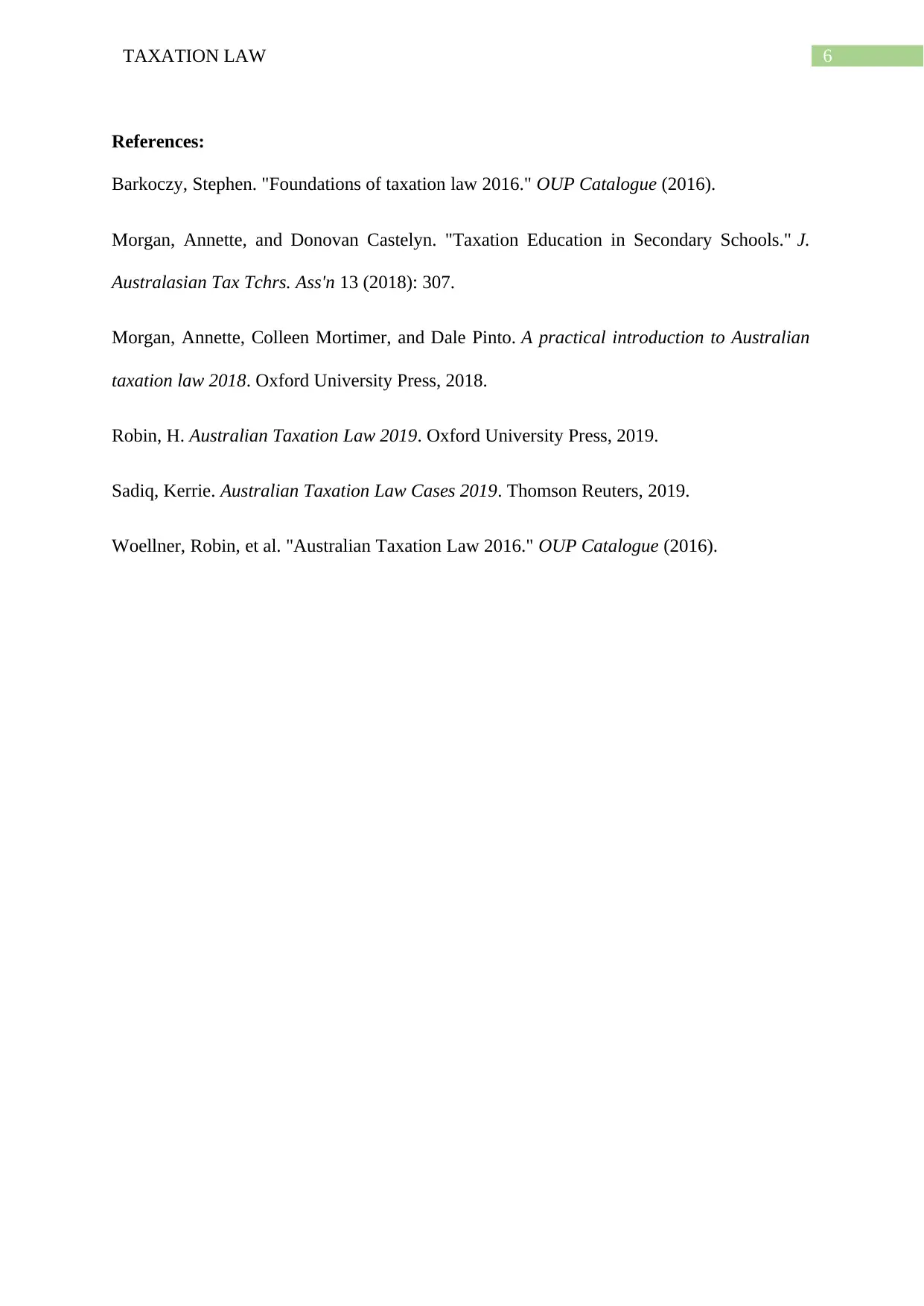
6TAXATION LAW
References:
Barkoczy, Stephen. "Foundations of taxation law 2016." OUP Catalogue (2016).
Morgan, Annette, and Donovan Castelyn. "Taxation Education in Secondary Schools." J.
Australasian Tax Tchrs. Ass'n 13 (2018): 307.
Morgan, Annette, Colleen Mortimer, and Dale Pinto. A practical introduction to Australian
taxation law 2018. Oxford University Press, 2018.
Robin, H. Australian Taxation Law 2019. Oxford University Press, 2019.
Sadiq, Kerrie. Australian Taxation Law Cases 2019. Thomson Reuters, 2019.
Woellner, Robin, et al. "Australian Taxation Law 2016." OUP Catalogue (2016).
References:
Barkoczy, Stephen. "Foundations of taxation law 2016." OUP Catalogue (2016).
Morgan, Annette, and Donovan Castelyn. "Taxation Education in Secondary Schools." J.
Australasian Tax Tchrs. Ass'n 13 (2018): 307.
Morgan, Annette, Colleen Mortimer, and Dale Pinto. A practical introduction to Australian
taxation law 2018. Oxford University Press, 2018.
Robin, H. Australian Taxation Law 2019. Oxford University Press, 2019.
Sadiq, Kerrie. Australian Taxation Law Cases 2019. Thomson Reuters, 2019.
Woellner, Robin, et al. "Australian Taxation Law 2016." OUP Catalogue (2016).
1 out of 7
Related Documents
Your All-in-One AI-Powered Toolkit for Academic Success.
+13062052269
info@desklib.com
Available 24*7 on WhatsApp / Email
![[object Object]](/_next/static/media/star-bottom.7253800d.svg)
Unlock your academic potential
Copyright © 2020–2026 A2Z Services. All Rights Reserved. Developed and managed by ZUCOL.




![Australian Taxation Law Assignment - [University Name]](/_next/image/?url=https%3A%2F%2Fdesklib.com%2Fmedia%2Fimages%2Fpp%2Fe9f1fed094374942a8bfa397580ff0f6.jpg&w=256&q=75)
